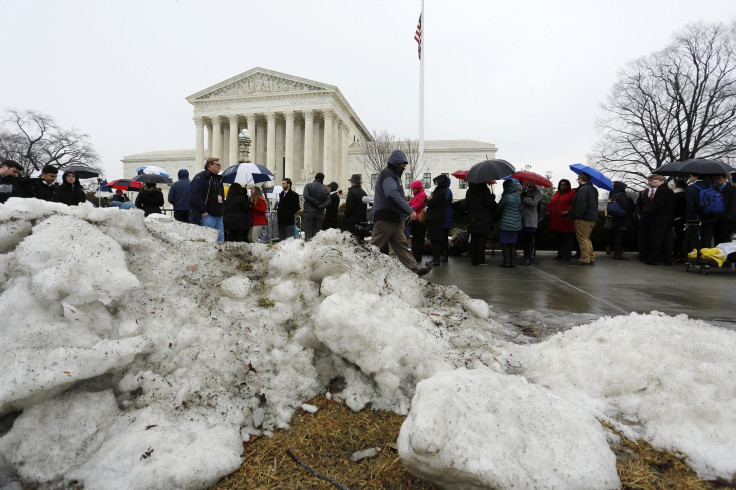King v. Burwell Places Obamacare On Trial Once Again… What Is Twitter Saying?

It is raining in Washington, D.C. today, yet dozens of supporters and opponents of Obamacare waited outside the Supreme Court as the justices inside heard arguments in King v. Burwell. Whether they held signs reading “Don’t Take My Care” or “Keep the IRS Out of My Healthcare,” many, reportedly, were swaying to the pop music blasting over the crowd. However you read such a scene, a great deal depends on how the court will rule on the case being heard today. Between six and eight million people could lose their health care subsidies, leaving them unable to afford coverage. Obamacare, as we know it, could be gutted and left for dead.
Meanwhile, #SupremeCourt was alive with reports, thoughts, and comments on the news. Though many worried the Supreme court would not favor the Affordable Care Act, most who tweeted believed it's still too early to call the decision. More than one commenter noted how Justice John Roberts “said almost nothing” during the hearing. Meanwhile, others kept their gaze on Justice Anthony Kennedy, the perennial swing vote, wondering whether he was open to or even "sold" on the government’s argument. After all, it will be Roberts and Kennedy who will cast the crucial votes, according to Politico.

To understand King v. Burwell, a little background information will provide context. The ACA required states to establish online marketplaces known as exchanges. It offered states the option of creating their own exchanges or relying on a federal marketplace, HealthCare.gov. While 16 states created their own exchanges, 34 chose to go with a federal marketplace. (Currently, 37 states wholly or partially use a federal marketplace.)
To make health insurance affordable, the law offers subsidies for coverage obtained through exchanges “established by the State.” And it is these four innocuous-sounding words that have become the crux of the plaintiffs’ argument in King v. Burwell.
“Critically, the Act only subsidizes coverage through an Exchange established by a state,” argue the plaintiffs’ lawyers. If Congress had wanted subsidies to be available on all exchanges, it would have said so. In fact, this wording was intended as an incentive for states to set up their own marketplaces, they say. Because of this, it would be illegal to distribute tax subsidies to those who purchased on a federal exchange. (Until now, the Internal Revenue Service has made its tax credits available to qualified individuals purchasing insurance on either exchange, whether state or federal.)
Meanwhile, the government contends the four words buried in Section 1401 of the 2,400-page law do not invalidate the overall intent of the complex law. While the language may not be crystal clear, the lawyers say, federal agencies should be given a little leeway to sort out the details. Besides, much of the content of the law points to a universal system of exchanges operating under the umbrella of a nationwide subsidy system.
Outcome
If the court sides with the government, Obamacare will continue as it has for now. However, a ruling for the plaintiffs would mean up to eight million people will lose their subsidies. Premiums will spike, some analysts claim, because insurers would leave the market leaving only the sickest people who need insurance to pay the full cost of coverage. Effectively, the law would be invalidated and so the president’s singular legislative achievement would be destroyed.
Though many justifiably are worried about what's to come, change to the health care system is in the wind. For some time now, many political and health care experts have been saying that the future of health care is uncertain and undecided no matter whether Obamacare remains in place or goes. The Republican party has been trying to come up with a replacement plan, while many Democrats, though less vocal, say they want a few tweaks and fixes to the existing law.
Fact is the Affordable Care Act has never worked exactly as designed for any number of reasons, including technology glitches and economic realities. Still, the law changed the health insurance landscape so dramatically, there’s no going back now, and whoever controls the political football in the years ahead, changes will be made. While it matters how King v. Burwell shakes out, the nation is moving towards a new vision of health care in the long-term either way.



























